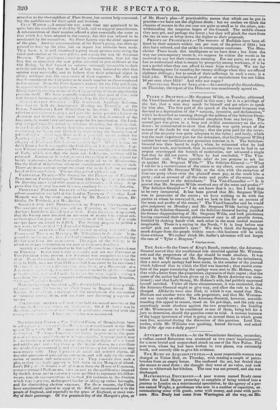TYLER V. DILAYTON.—Mr. Sergeant Wilde, on Tuesday, addressed the Vice-Chancellor
at great length in this case ; for it is a privilege of the bar, that a man may speak for himself and get others to speak for him also. The lirst part of the speech of the learned Sergeant was devoted to a deprecation of the " sarcasm, invective, and declamation," which he described as running through the address of the Solicitor-Gene. cal in opening the case ; a whimsical complaint from any lawyer. The second part was given to a long and skilful commentary on the evi. deuce: he endeavoured to show that Jenkins was quite aware of the nature of the deeds he was signing ; that the price paid for the rever- sion of the property was quite adequate to the value ; and lastly, which was the most important part for the defendant, that he (Sergeant 'Wilde) neither had nor could have any pecuniary interest in it. The Solicitor. General was then heard in reply ; when he reiterated what he had stated last week, and insisted, that in conducting the case he had in no respect overstepped the bounds of moderation, nor advanced a single fact that lie did not prove. When he had concluded, " The Vice- Chancellor said,' " What specific relief do you propose to ask for as against Mr. Sergeant Wilde ?" The Solicitor-General — " What I ask for is a reconceyance of the estate to my client, costs against all parties as well Mr. Sergeant Wilde as the rest, with the exception of that one party whose costs the plaintiff must pay, as she made him a party ; and an account of all the rents and profits of the estate since it was conveyed to the defendants." The Vice-Chancellor —" Is it proved that Mr. Sergeant Wilde received any of the rents and profits ?" The Solicitor-General —" I do not know that it is ; but I hold that to be very immateriaL It has been proved that Mr. Sergeant Wilde was in possession of the estate ; we have nothing to do with the parties to whom he conveyed it, and we look to him for an account of the rents and profits of the estate." The Vice-Chancellor said he would give judgment on Monday ; and Mr. Sergeant Wilde having clapper- clawed the Solicitor-General, and the Solicitor-General having justified his former clapperclawing of Mr. Sergeant Wilde, and both gentlemen having expressed their strong abhorrence of cant in all possible forms, finished by shaking hands with each other in the most cordial manner imaginable. There is a saying in the North, " It is long before one corbie* pick out another's eyes." We don't think the Sergeant in much danger from the people within court—his business will be with those without. We rather think Mr. Sadler's advocates will not forget the case of " Tyler v. Drayton." * Carrion crow.
THE AGE.—Ill the Court of King's Bench, yesterday, the Attorney- General moved that the conditional rule obtained against Mr. Westma- cott and the proprietors of the Age should be made absolute. It was stated by Mr. Williams and Mr. Sergeant Denman, for the defendants, that a most ample apology had been made, in the number of the journal which followed that in which the libel was inserted; that twelve num. hers of the paper containing the apology were sent to Mr. Holmes, toge- ther with a letter from the proprietors, expressive of their regret ; that the name of the author had been given up (a Mr. Bertie Ambrose was men- tioned); and that Lady Strong, Mr. Holmes's wife, had publicly expressed herself satisfied. Under all these circumstances, it was contended, that the Attorney-General ought to give way, and allow the rule to be dis- charged. Affidavits were also filed, in which it was stated that Mrs. Durham and another were the sole proprietors, and that Mr. 'Westma- cott was merely an editor. The Attorney-General, however, notwith- standing this appeal to reason, stood on his privilege, and the rule was accordingly made absolute against the two proprietors ; the liability of Mr. Westmacott to be considered as one of them, being left for a jury to determine, should the question come to trial. A curious instance of the happy ignorance of what is going on around them in which great men live, occurred during the discussion of this question. Lord Ten- tee-den, while Mr. Williams was speaking, leaned forward, anti asked him if the Age was a daily paper:


















 Previous page
Previous page